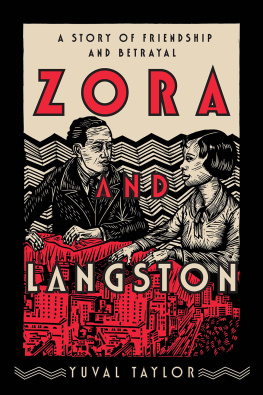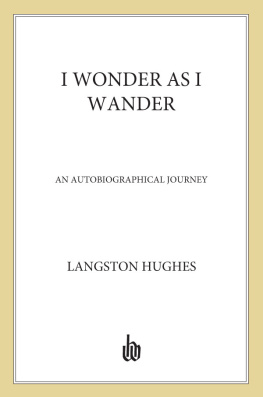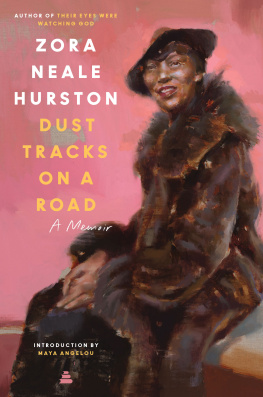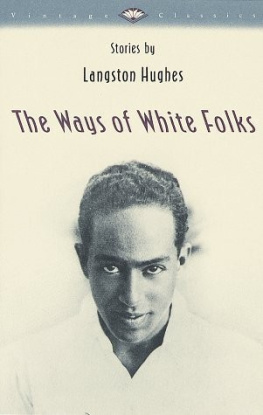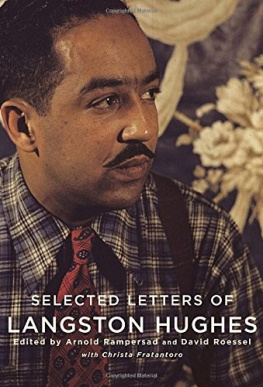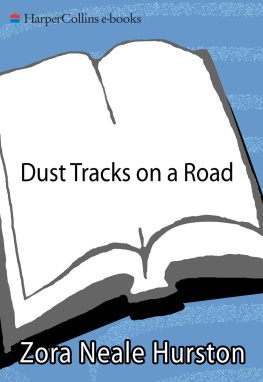Contents
Guide

Zora and Langston
OTHER BOOKS BY YUVAL TAYLOR
Darkest America:
Black Minstrelsy from Slavery to Hip-Hop
(with Jake Austen)
Faking It:
The Quest for Authenticity in Popular Music
(with Hugh Barker)
Growing Up in Slavery:
Stories of Young Slaves as Told by Themselves
(editor)
I Was Born a Slave:
An Anthology of Classic Slave Narratives
(editor)
Zora and Langston
A STORY OF FRIENDSHIP AND BETRAYAL
YUVAL TAYLOR

Since this page cannot legibly accommodate all the copyright notices, pages 28182 constitute an extension of the copyright page.
Copyright 2019 by Yuval Taylor
All rights reserved
First Edition
For information about permission to reproduce selections from this book, write to Permissions, W. W. Norton & Company, Inc., 500 Fifth Avenue, New York, NY 10110
For information about special discounts for bulk purchases, please contact W. W. Norton Special Sales at specialsales@wwnorton.com or 800-233-4830
Book design by Chris Welch
Production manager: Beth Steidle
The Library of Congress has cataloged the printed edition as follows:
Names: Taylor, Yuval, author.
Title: Zora and Langston : a story of friendship and betrayal / Yuval Taylor.
Description: First edition. | New York : W.W. Norton & Company, [2019]
Identifiers: LCCN 2018050513 | ISBN 9780393243918 (hardcover)
Subjects: LCSH: Hurston, Zora Neale. | Hughes, Langston, 19021967. | African American authors20th centuryBiography.
Classification: LCC PS3515.U789 Z93 2019 | DDC 813/.52 [B]dc23
LC record available at https://lccn.loc.gov/2018050513
ISBN 9780393243925 (ebook)
W. W. Norton & Company, Inc., 500 Fifth Avenue, New York, N.Y. 10110
www.wwnorton.com
W. W. Norton & Company Ltd., 15 Carlisle Street, London W1D 3BS
To my wife, editor, and best friend, Karen
I think of Zora Neale Hurston and Langston Hughes as literary parents, or guardians. I am always amazed when I read of their arguments and fallings out, and the eternal blame for their difficulties that is heaped on one of them or the other.
When I consider the ending of their friendship I am filled with sadness for them. It is so easy to see how and why they would love each other. Each was to the other an affirming example of what black people could be like: wild, crazy, creative, spontaneous, at ease with who they are, and funny. A lot of attention has been given to their breakup... but very little to the pleasure Zora and Langston must have felt in each others company. I like to think of them wandering about together in the early days, Zora showing Langston the close-up beauty of people in the deep South, and Langston returning the kindness, thoughtfulness and generosity that came easily to him with people he liked. I like to think of them telling each other jokes, eating fried chicken and watermelon, zooming about in Zoras little car, laughing. Which I figure was one of the main things they did.
In any event, I have drawn on these guardian spirits over the years, as I have drawn on my biological parentswho were also known to have a few fights and a royal falling-out or twoand I have never felt that they were fundamentally at odds. Or that their characters were particularly flawed. If anything, again like ones parents, I feel that, spiritually, Langston and Zora resembled each other. And certainly... I have felt nurtured and nourished by both of them.
ALICE WALKER,
Turning Into Love: Some Thoughts on Surviving and Meeting Langston Hughes (1989)
CONTENTS
C ollaborators, social and literary gadflies, and very close companions, Zora Neale Hurston and Langston Hughes enjoyed a fascinating friendship. They worked together on a magazine called Fire!! and a comedy called Mule Bone , wrote scores of letters to each other, and traveled together through the South. Yet they had a terribly bitter falling out; Langston would later describe Zora as a perfect darkie, while Zora would leave the friendship out of her autobiography altogether.
Zora and Langston were not, as far as we know, sexually involved, but their relationship was loving. Zora signed her letters to Langston love or lovingly yours; she told him quite honestly that he was not only her best friend but the nearest person to me on earth. Their long and frank letters are suffused with warmth and feeling. This book explores their friendship from their first meeting in Harlem in 1925 to their final breakup in Cleveland in 1931and beyond.
Zoras 1937 Their Eyes Were Watching God remains the single most widely read book ever written by an African American (it outsells even Invisible Man, I Know Why the Caged Bird Sings, The Color Purple, A Raisin in the Sun, Narrative of the Life of Frederick Douglass, and The Autobiography of Malcolm X ). Scholar Charles H. Nichols rightly called Langston the most prolific and influential Afro-American writer in our history. Together Zora and Langston invigorated the Harlem Renaissance, promulgating ideas about African American expression that fundamentally changed the course of American letters.
Their friendshipby turns warm, engaging, inspiring, intellectual, adoring, jealous, inflamed, and doomedinformed practically everything they wrote during those years, and to a great extent thereafter. They jointly brought to life a new conception of African American literature quite unlike any that had come before. Controversially, they celebrated Negroes as almost elemental beings, in touch with instincts that white culture had lost sight of. But this shared vision greatly enriched their work.
Langston rarely engaged in physical relationships with people he knew well. Zora never admitted to having any sexual desire for him. Yet their relationship had all the hallmarks of a mnage troisor, more accurately, a mnage cinq. For they shared the munificence of their wealthy white patron Charlotte Osgood Mason, who insisted on being called Godmother, but who in her caprice and impatience was more like the Godfather. Paying them lavishly and trying to control their output, she enlisted each of them in her pet cause: to advance the idea of the American Negro as the archetypal primitive, a bridge to an uncorrupted world. Besides Mason, whose relationship with Langston was the most passionate of his young life, two others were entangled with them: Louise Thompson, a lovely young black woman (for a short time married to the homosexual writer and editor Wallace Thurman) who helped them with Mule Bone and of whom Zora became wildly jealous; and Alain Locke, a black philosophy professor whose thwarted desire was likely one reason he turned against Langston in the end.
Masons and Zoras almost simultaneous betrayal of Langston absolutely devastated him. He reacted with claims of plagiarism and a threatened lawsuit. But it devastated Zora too. Eight years after their breakup, she asked Langstons friend Arna Bontemps to tell him that the cross of her life is the fact that there has been a gulf between you and her. She said she wakes up at night crying about it yet.
In the aftermath, Langston abandoned the primitivist ideology that had fed much of his most enduring work and turned instead to Communism. Zora, on the other hand, added more nuance to her primitivism and shaped it into a novel whose Shakespearean power remains unabated over eighty years after its creation. Yet Langston, whose capacity for adaptation seemed limitless, remained at the center of the African American literary scene, while Zora was pushed to its margins. The entire literary establishment, black and white, abandoned her, and she died forgotten, even by the man who was once her closest friend.

